Last year, I made a trip to one of the world's oldest wine making regions - the Caucasus. As a tourist destination, this little known region has been criminally under-represented in the traveler community. It consists of Georgia, Armenia, Azerbaijan and a part of Russia. In the following two-part travelogue, I describe my experiences in Georgia.
GEORGIA: Not Asia, and not quite Europe
A six hour layover at Sharjah International Airport seemed like an eternity as I watched a quarter of the world go by. Middle easterners, Central Asians, Africans, Russians, Pakistanis and of course a lot of Indians, all waiting to transfer to their outbound flights. The waiting area looked more like a large bank than airport, only the duty-free shops giving it away. People from every class of society shared cramped spaces. A bunch of people even lay on the floor, around pillars, waiting for visas to come through, reminding me of Indian railway stations. Many of the employees at the airport, men behind desks, controlling queues at security check points could be identified as Malayalis. Sometimes it felt like I never left India.
It grew really tiring after a while and I knew I would hate this place even more as I had a 15 hour layover, without a transit visa to Sharjah, on the way back. I was looking forward to Georgia and was determined to not let this place get to me.
Only five days ago, I had decided to fly to Georgia almost on impulse when I discovered that I could visit on my US visa and didn't need to apply and wait for a Georgian visa. When I managed to find really cheap air tickets, I took it as a sign from the universe.
Georgia is a country located in the Caucasus region, sandwiched between Russia and Turkey. It also shares borders with Armenia and Azerbaijan on the east, and the Black Sea to the west. There has long been some ambivalence about the exact identity of Georgia, owing to it's unique location, language and culture. This is because the Caucasus region can be called either Asian or European depending on which definition you are looking at or which way you demarcate the two continents. Georgia straddles both and geographically is more likely to be called Asia, but culturally, Europe. Georgians consider themselves to be European and I would agree, having seen the people, culture and most of their architecture. Many of the streets even remind you of Europe and the major religion is orthodox Christianity, as opposed to Islam in neighboring Azerbaijan. I think there is an aspiration among modern Georgians to join the EU in the coming years.
A three hour flight from Sharjah brought me to Tbilisi, the capital of Georgia. Immigration was a breeze, much easier than at Bangalore. Getting out of the airport, I was greeted by the familiar sight of taxi drivers waiting around the exit. Public transport in Tbilisi is really cheap. One way travel from point to point costs just 0.50 GEL (Georgian Lari), also referred to as 50 tetri, which is roughly 14 INR. This is the standard price for both buses and metro trains, regardless of station or distance. Even the airport shuttle costs the same. Taxis are a more comfortable option to hit the city. They cost around 25 GEL (~700 INR) from the airport but the drivers always start off with 60 or 75 GEL and negotiate downwards. If you do not do your homework, you can easily end up paying 1500 to 2000 INR for a 14 INR ride!! I took the bus. You can later buy a travel card for 2 GEL and fill it with money and just tap whenever you are at a station. This is a completely refundable card that you can return when leaving and is available at any metro station
In Georgia, not unlike in India, there is a saying that 'a guest is a gift from god'. They demonstrate this at every opportunity whether they speak your language or not. Ask one for help and you will be guaranteed to have at least two or three coming forward. Although Georgian is the main language, many people, especially the older generation from the soviet era speak or understand Russian. Knowing just three or four phrases in Russian, I had to make do with English, which is not a problem with modern, younger generation of Georgians, but can be awkward with most others. An old man in the bus was trying to find out where I was from. Another Russian tourist who could speak English helped translate. The moment he found out I was Indian, he shouted "Hey, Raj Kapoor" and channeled his inner Bollywood. This was to be the first of many routines I would see when talking to elderly Georgians throughout my visit. The English speaking Russian tourist had been there for several days already and helped me orient by giving me useful tips.
A signboard in Georgian and English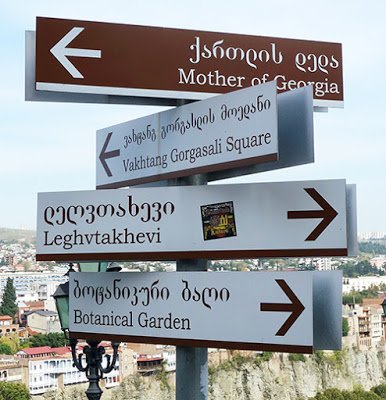
The Georgian language is special in that it belongs to a family of languages known as the "Kartvelian" group that does not belong to any known language family, unlike some European languages that can be placed into the Indo-Aryan tree. It has it's own script that I found maddeningly complicated - like a mix of Malayalam and Sinhala, to my eyes. And most of the names and places end with an "i" ('ee' sound) similar to many Italian surnames (eg. Rustaveli, Baratashvili, Marjanishvili are all famous street names in Tbilisi). In fact, "Georgia" is the anglicized name used by outsiders. The original, local name for the country in their language is "Saqartvelo"
Tbilisi was cold and it had been raining before I arrived. It was getting dark and sombre as I got down at the Opera bus stop on Rustaveli street and looked for my hostel. The streets were named after famous personalities, for eg. this one was based on Shota Rustaveli, a famous 12th century Georgian poet. This is the "touristy" location in Tbilisi catering to outsiders with everything Georgian showcased and expensive.




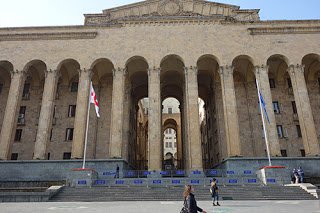

My hostel was run by an Azerbaijan family. A majority of the immigrants in Georgia come from this neighboring country. I was made to feel really welcome and helped in every way. There was a kids' football team visiting from Azerbaijan while I was there and they were excited to meet someone from "Hindoostan" and took selfies with me.
I was in Georgia for only a short time and decided to stay put in one or two places and get to know them really well instead of doing the usual tourist circuit and cover as many destinations as possible. My main points of interest were Tbilisi and Batumi. I wanted to include the mountains of Kazbegi, a must visit, but I wasn't really prepared for the cold weather and decided to skip it this time. But if you are one of those who likes to visit as many places as possible, consider including Kazbegi, Mtskheta, Kakheti, Svaneti, Ananuri and Sighnaghi. There are tons of tour operators in the city that take groups for sightseeing and cover most of these places.
Tbilisi is an old town with a lot of culture and history behind it. There are many old churches, museums, pre-war buildings and monuments, each with a story behind it.

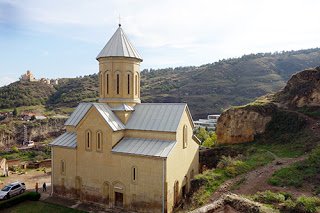
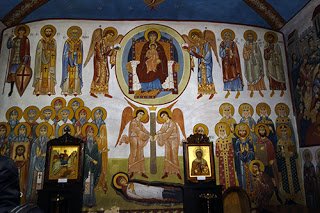
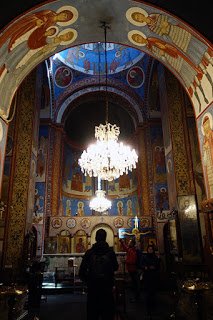
And they love their statues... there were so many of them everywhere around the country.
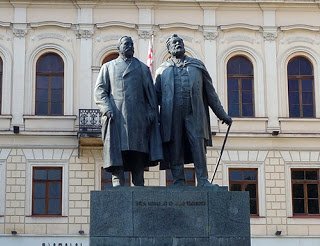
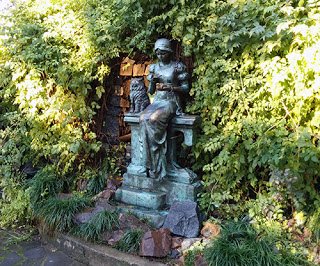
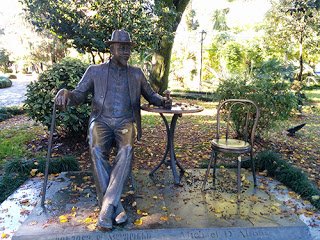
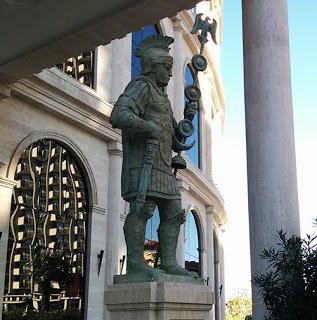
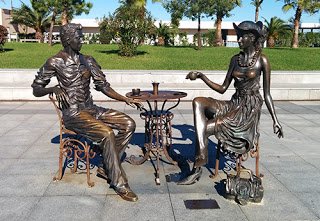
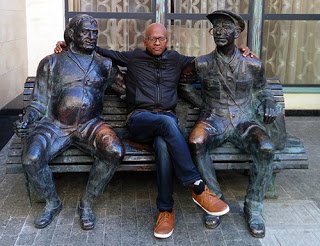
People, religion and lifestyle:
Orthodox Christianity is the major religion in Georgia, although there is a small percentage of Islam these days due to immigrants. People, especially the older generation, are conservative, although I never encountered anyone with an in-your-face missionary agenda. They are usually quiet and keep their practices to themselves. Almost all Georgians stop to cross themselves while walking across a church, dropping whatever they were doing temporarily. They are very close knit as a community and strongly family oriented. Majority of the people I met were gentle and friendly. If anything, they tend to keep away from foreigners unless someone asks for help but are very curious. A random girl on the street wanted a selfie with me. But not everybody will give you a second look and most will leave you alone.

Many people in Georgia are named Georgi (men) or Nino (women), after the famous saints who preached and spread Christianity in Georgia in the early centuries. Several times I met men who introduced themselves as Georgi and Georgi. The 'g' is pronounced as in 'Gigabyte' and not with a 'J' sound as in the English 'George'.
Tbilisi is crowded given that it is the largest city and the capital, but most people here are very laid back and relaxed. Their day begins very late, usually after 10 AM and most people retire very late at night. Parks have people, kids chatting outside universities, people out and about for a drink, food or smoke any time of the day. Used to the hustle and bustle of Bangalore, I was left wondering when Tbilisians work, study and how they earned. There was definitely no pressure to excel in a career and get ahead like we are used to in our lives. But Georgia is by no means a rich country. I saw a lot of poor people and even beggars on the streets.
Georgians do not have strict public smoking laws, or at-least nobody enforces it. Practically everyone smokes everywhere, even indoors sometimes, there are no segregated places earmarked. So if you are easily offended by smoking or do not tolerate second hand smoking, you might need to be prepared. There are some restaurants where I found separate "non-smoking" areas inside.
Tbilisi is generally very safe for anyone, foreigner or single woman at any time of the day or night. Most shops I saw just locked their front glass doors while closing for the day, and rarely had multiple doors and shutters to lock away their wares. Even my hostel owners would go out routinely leaving the door open. I never had any bad experience with crime. This could also be due to the huge number of police patrol vehicles, especially at night. On important streets like Rustaveli, Baratashvili or Marjanishvili, I saw two police vehicles on each side of the road go to and fro every two minutes!! Talk about overkill.
But the most I have seen them in action was for traffic offenses and parking violations. I was told that the police system was largely corruption free.
Food and drink:
Georgia is famous for it's wines and a strong liquor named cha-cha. The Caucasus region is one of the oldest wine making regions in history. As you walk around and visit restaurants and homes, it's not uncommon to be invited for a wine tasting. Generous hosts open up their stocked bottles for you. The Georgian capacity to down alcohol is huge. They can fill glass after glass through the night and go to bed sober. Wine is really inexpensive as well.
Traditional Georgian food consists of a lot of bread and cheese. Their favorite food is the Khachapuri and Khinkhali. Khachapuris are basically different types of flat breads, not unlike pizza bases, but filled with local cheese called sulguni. Just bread with rich cheese filling. Some other regional varieties have eggs and butter on them as if the calorie count was not enough. There are few local options which are not calorie rich, most are low on vegetables and yet most of the Georgians I met were ruddy and healthy.
Khinkhali is basically a Georgian momo - a kind of dumpling with fillings. Whereas momos have mixed fillings, thin skins and are served by plate with spicy sauce, Khinkhali's are thick, filled with one item (say meat, mushroom, potato or cheese) and are served per piece. They are very juicy but completely bland for my taste.
After several days I got tired of the taste of greasy bread and cheese. But fortunately there were other options available. Due to the proximity of Russia and Turkey, there were a lot of Turkish and Russian items on most menus. There are also a couple of Indian restaurants in Tbilisi where I sampled some biryani and pakodas.
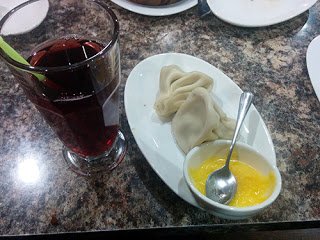
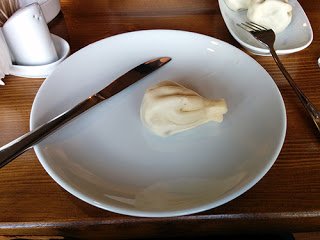
Georgia is known for it's many hot water and mineral rich springs. Natural water consumption here is healthy and people drink right out of taps and the many water fountains laid throughout the city. In-fact lemonades and other flavored soda made of this water are highly popular. Be sure to try some Natakhtari lemonade when you are here. They are more popular than international brands like cola and pepsi.
There is also bottled mineral water called 'Borjomi' named after a place in Georgia, whose water is supposed to be medicinal. It has a unique taste and it is not uncommon for tourists to take back many bottles of Borjomi when they leave.
Churchkhela is a kind of sweet or candy made out of nuts. Walnuts or hazelnuts are strung on a thread with a needle and dipped in thick syrup made of fruit juice, mostly grape, pomegranate or cherry. These are hung out to be dried and look like large, colored bean pods. If you wish to try some, make sure to buy those that are not brightly colored red, yellow or green - they usually contain food coloring and are not desirable. The best ones are colored dark blue, dull brown or purple, may not be visually appealing but I think mostly natural. You need to yank the string out before consuming.
Turkish desserts like 'Baklava' and 'Turkish delight' are also widely found. These are super rich and sweet and generally consumed with tea.
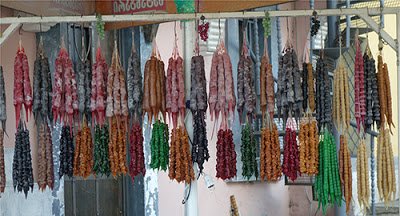

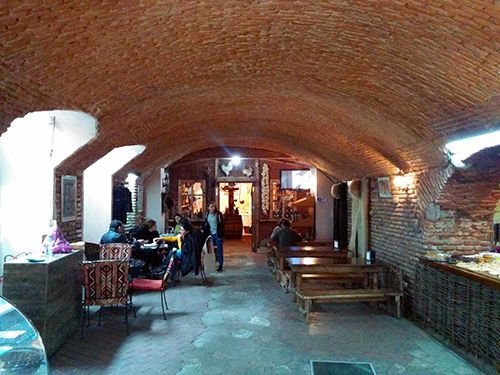
Old Tbilisi and other attractions
Most of the major attractions in Tbilisi are within walking distance of one another, if you have a few hours. I took one of the free walking tours that started from the city center called Freedom Square or Liberty Square. A good three and half hours later, we had covered a lot of points of interest including monuments, churches, the Peace bridge, parks, cable transport to the hill, Narikala fortress, botanical garden, mother of Georgia monument, waterfalls and the famous sulphur baths of Abanotubani along with a free whiff of rotten eggs - the tell-tale smell of sulphur.
I would recommend taking one of these free tours, where tipping at the end is voluntary. Or you could just visit the tourist information office on Liberty square for more information and explore on your own.
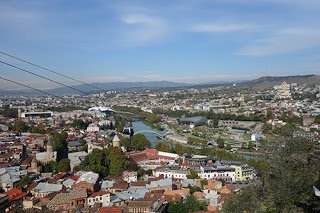

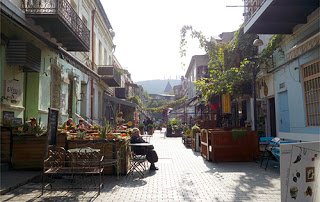

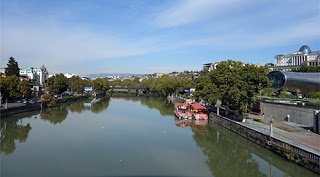

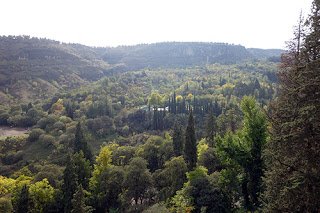
Known for it's wines and alcohol, needless to say, Tbilisi has many pubs, clubs and cafes throughout the city. If you have the time, I would recommend Dive - usually filled with expat Americans, Warsawa, my favorite - a Polish haunt near Pushkin Square or Generator 9.8 - with live music.
Everyday events in the city are updated on their page by the Free walking tour team here: https://www.facebook.com/TbilisiFreeWalkingTour/
I spent several days in Tbilisi, exploring the city, meeting and making new friends from places as diverse as Turkmenistan, Azerbaijan, Armenia, Pakistan, Russia, Poland and of course Georgia. With pleasant, sunny weather forecast for several days, I decided to check out the beach town of Batumi in the province of Adjara.
Continued in part 2
Never been in Georgia but I'm familiar with their delicious cuisine.
Thanks for sharing
Write good
Congratulations @rishiferrari! You have received a personal award!
Click on the badge to view your Board of Honor.
Do not miss the last post from @steemitboard:
SteemitBoard World Cup Contest - Home stretch to the finals. Do not miss them!
Participate in the SteemitBoard World Cup Contest!
Collect World Cup badges and win free SBD
Support the Gold Sponsors of the contest: @good-karma and @lukestokes
Congratulations @rishiferrari! You received a personal award!
You can view your badges on your Steem Board and compare to others on the Steem Ranking
Vote for @Steemitboard as a witness to get one more award and increased upvotes!